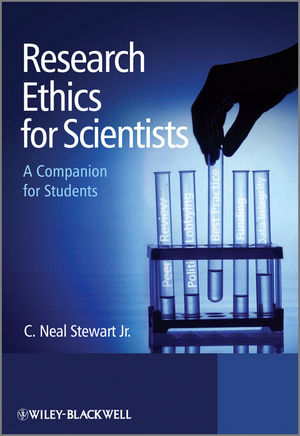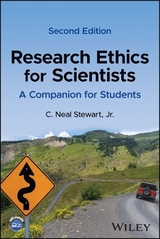
Research Ethics for Scientists
John Wiley & Sons Inc (Verlag)
978-0-470-74564-9 (ISBN)
Tackles the ethical issues of being a scientist rather than the ethical questions raised by science itself
Case studies used for a practical approach
Written by an experienced researcher and PhD mentor
Accessible, user-friendly advice
Indispensible companion for students and young scientists
C. Neal Stewart, Jr., Professor and Ivan Racheff Chair of Excellence, Department of Plant Sciences, University of Tennessee.
Preface xi Acknowledgements and Dedication xiii
Chapter 1 Research Ethics: The Best Ethical Practices Produce the Best Science 1
Judge yourself 4
Morality vs ethics 4
Inauspicious beginnings 6
How science works 7
Summary 9
Judge yourself redux 9
Chapter 2 How Corrupt is Science? 11
Judge yourself 12
"Scientists behaving badly" 12
Do scientists behave worse with experience? 14
Judge yourself 15
Crime and punishment 15
Judge yourself 17
Judge yourself redux 18
Judge yourself redux 19
Judge yourself redux 19
Summary 20
Chapter 3 Plagiarise and Perish 21
Ideas 23
Sentences 23
Phrases 23
A hoppy example 24
What is plagiarism, really? 24
Judge yourself 25
How many consecutive identical and uncited words constitute plagiarism? 25
Self-plagiarism and recycling 26
Judge yourself 27
Judge yourself 31
Tools to discover plagiarism 33
Self-plagiarism and ethics revisited 34
Judge yourself 34
Is plagiarism getting worse? 35
The case of the plagiarising graduate student 35
Judge yourself redux 36
v
Judge yourself redux 37
Judge yourself redux 37
Summary 38
Chapter 4 Finding the Perfect Mentor 39
Caveat 40
Choosing a mentor 40
Judge yourself 43
Choosing a graduate project 46
Judge yourself 47
Mentors for assistant professors 47
How to train your mentor 52
Choosing the right research project: the new graduate student’s dilemma 54
Judge yourself redux 56
Judge yourself redux 56
Summary 56
Chapter 5 Becoming the Perfect Mentor 57
Grants and contracts are a prerequisite to productive science 57
Judge yourself 58
Publications are the fruit of research 59
On a personal level 59
Judge yourself 60
Common and predictable mistakes scientist make at key stages in their training and careers and how being a good mentor can make improvements 60
Questions 70
Judge yourself redux 71
Judge yourself redux 71
Summary 72
Chapter 6 Research Misconduct: Fabricating Data 73
Why cheat? 74
Judge yourself 76
The case of Jan Hendrick Sch¨on, "Plastic Fantastic" 76
The case of Woo-Suk Hwang: dog cloner, data fabricator 77
Judge yourself 78
Detection of image and data misrepresentation 78
Judge yourself 81
Neither here nor there – the curious case of Homme Hellinga 81
Judge yourself 83
Lessons learnt 83
Judge yourself redux 84
Judge yourself redux 84
Judge yourself redux 84
Summary 85
Chapter 7 Research Misconduct: Falsification and Whistleblowing 87
A "can of worms" indeed: the case of Elizabeth "Betsy" Goodwin 89
Judge yourself 91
Judge yourself 92
Judge yourself 94
Judge yourself 98
Deal with ethical quandaries informally if possible 99
Judge yourself 100
Cultivating a culture of openness, integrity, and accountability 100
Judge yourself redux 101
Judge yourself redux 102
Judge yourself redux 102
Judge yourself redux 102
Judge yourself redux 103
Summary 103
Chapter 8 Authorship: Who’s an Author on a Scientific Paper and Why 105
The importance of the scientific publication 106
Judge yourself 107
Who should be listed as an author on a scientific paper? 107
Judge yourself 109
How to avoid author quandaries 110
Authorship for works other than research papers 111
The difference between authorship on scientific papers and inventorship on patents 112
Other thoughts on authorship and publications 113
Judge yourself 114
Judge yourself redux 118
Judge yourself redux 118
Judge yourself redux 119
Summary 119
Chapter 9 Grant Proposals: Ethics and Success Intertwined 121
Why funding is crucial 121
Judge yourself 125
Path to success in funding 125
Fair play and collaboration 126
Judge yourself 126
Judge yourself 128
Recordkeeping and fiscal responsibility 128
Pushing the limits on proposals 129
Judge yourself redux 133
Judge yourself redux 133
Judge yourself redux 134
Summary 134
Chapter 10 Peer Review and The Ethics of Privileged Information 135
The history of peer review 135
The nature of journals and the purpose of peer review 136
Which papers to review? 140
Anonymity 140
Judge yourself 141
Grant proposals 141
Confidentiality and privileged information 142
Reviewers 143
Judge yourself 143
Judge yourself redux 145
Judge yourself redux 145
Summary 146
Chapter 11 Data and Data Management: The Ethics of Data 147
Stewardship of data 148
Judge yourself 149
Judge yourself 153
Judge yourself 156
The land of in-between: ethics of data presented at professional meetings 156
Judge yourself 159
Future of data management 160
Judge yourself redux 160
Judge yourself redux 160
Judge yourself redux 161
Judge yourself redux 161
Summary 161
Chapter 12 Conflicts of Interest 163
The dynamic landscape of conflicts of interest 164
Potential conflicts of interest for university scientists 165
Judge yourself 169
Conflicts of interest within labs or universities 169
Judge yourself 170
Judge yourself redux 177
Judge yourself redux 177
Summary 177
Chapter 13 What Kind of Research Science World Do We Want? 179
"A culture of discipline and an ethic of entrepreneurship" 180
Judge yourself 181
Too much pressure? 181
Integrity awareness through ethics education 184
Accountability 185
We scientists 185
Judge yourself redux 186
Summary 187
Appendix 189
References 203
Index 209
| Verlagsort | New York |
|---|---|
| Sprache | englisch |
| Maße | 165 x 239 mm |
| Gewicht | 386 g |
| Themenwelt | Geisteswissenschaften ► Philosophie ► Ethik |
| Naturwissenschaften ► Biologie ► Allgemeines / Lexika | |
| ISBN-10 | 0-470-74564-9 / 0470745649 |
| ISBN-13 | 978-0-470-74564-9 / 9780470745649 |
| Zustand | Neuware |
| Informationen gemäß Produktsicherheitsverordnung (GPSR) | |
| Haben Sie eine Frage zum Produkt? |
aus dem Bereich



